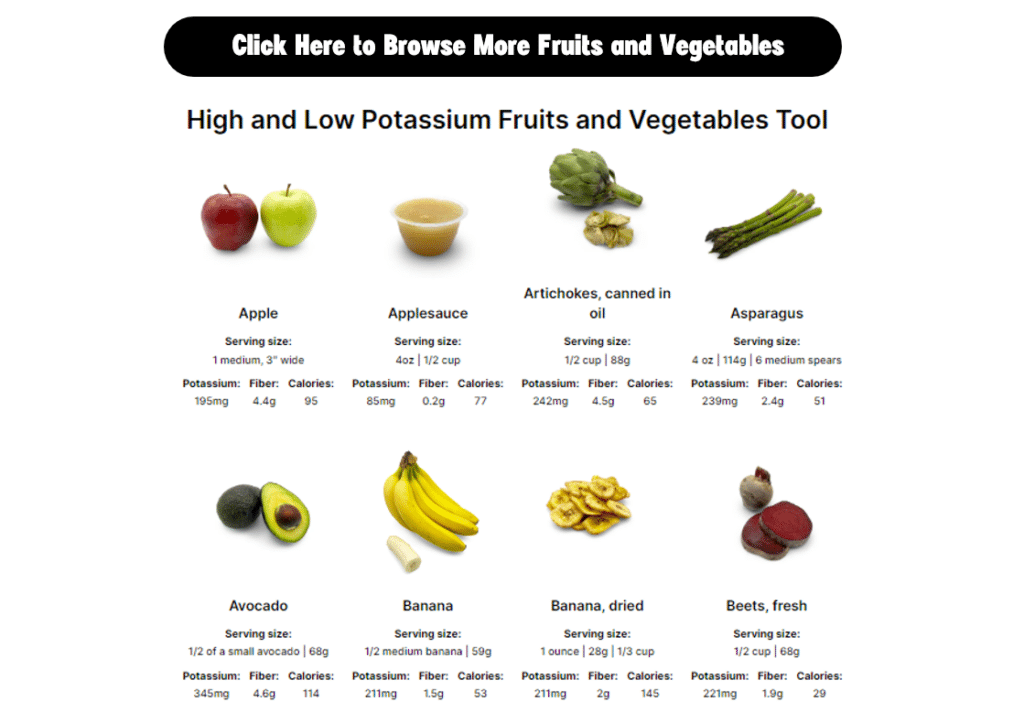Is asparagus bad for kidneys?
No, asparagus is rich in antioxidants, fiber, and vitamins that are beneficial to people with kidney disease.
This post may contain affiliate links through which we may earn a small commission to help keep this website free.
Despite the odor produced in the urine after eating asparagus, asparagus is not bad for kidneys. Some species of asparagus have been studied and found to have a diuretic effect while an extract of asparagus was found to have anti-inflammatory properties.
In addition to being rich in antioxidants, asparagus contains 23% of your daily requirement for Vitamin K, which is an important mineral in preventing blood clots.
Asparagus contains 1.4mg of iron, which is 18% of the recommended daily allowance for iron for adult men. Iron is an important mineral for helping to prevent anemia in chronic kidney disease.
Is asparagus high in potassium?
No, asparagus is a low potassium vegetable. One 1/2 cup serving of asparagus, or approximately 67g, contains 136mg of potassium.
Many kidney professionals consider a vegetable to be high in potassium if it contains more than 200mg of potassium.
If you have kidney disease, you should not restrict your intake of fruits and vegetables because of potassium content unless instructed by your kidney dietitian or healthcare provider. Many people who have kidney disease do not need to restrict their intake of potassium. There are many other factors that could cause you to have high potassium levels that are not related to the food you eat. You can learn more about potassium and kidney disease through our low cost course.
Is asparagus high in phosphorus?
No. One half cup of asparagus contains about 35mg of phosphorus. The phosphorus found in asparagus is natural and poorly absorbed by the body, so it is considered a low phosphorus food.
For more information about phosphorus and kidney disease, check out our youtube video.
What are the benefits of asparagus?
- Asparagus is high in vitamins and antioxidants, such as Vitamin K, Vitamin C, and Folate. Antioxidants consumed through fruits and vegetables are considered to have protective effects against many chronic diseases.
- Asparagus also contains fiber, which helps to maintain blood sugar, improve gut health, and help maintain good potassium levels. The fiber content helps prevent constipation and supports a healthy digestive system. Avoiding constipation is an important way of helping maintain good potassium levels.
- Research shows that a low intake of fruits and vegetables is associated with an increased risk of developing kidney failure in people with kidney disease (as well as those who don’t have kidney disease), so be sure to eat adequate fruits and vegetables each day.
Is asparagus high in oxalates?
Multiple sources have indicated that asparagus is a low oxalate food, however there have been some sources that indicate that asparagus may be as high as 18mg per 100g, however that data may be outdated. If you are prone to developing kidney stones, avoiding oxalates is not necessarily the best approach to preventing future stones. I recommend signing up for my free kidney stone newsletter where I talk a lot about kidney stones, how to read your labwork, and what nutrition strategies to implement to prevent future stones.
Oxalates are naturally occurring compounds found in many foods. When consumed, oxalates can bind with calcium in the body to form crystals, which can contribute to the formation of kidney stones in some individuals.
Kidney stones are hard deposits that form in the kidneys when there are high levels of certain substances, such as calcium, oxalate, and uric acid, in the urine. The most common type of kidney stone is calcium oxalate stones, which are formed when calcium and oxalate combine in the urine.
While oxalates are present in many foods, not everyone who consumes oxalates will develop kidney stones. Factors such as individual susceptibility, overall diet, and lifestyle choices play a role in kidney stone formation.
The highest oxalate fruits and vegetables are spinach, rhubarb, and swiss chard. However, it’s important to note that the mere presence of oxalates in food does not guarantee kidney stone formation. If you are not prone to developing kidney stones, then there is no reason to avoid foods that are high in oxalate.
Healthy ways to eat asparagus?
- Roast in the oven with a drizzle of olive oil and your favorite salt-free seasonings.
- Grill it – brush with olive oil and season, then grill to add a smokey flavor.
- Add cooked asparagus to salads. Cook it your preferred way, chop into bit size pieces, and then add to salads.
- Chop into bite size pieces and add to stir fries.
High and Low Potassium Fruit and Vegetable Tool
Looking for more information on other kidney friendly fruits and vegetables? Check out our Fruit and Vegetable Potassium Tool.

